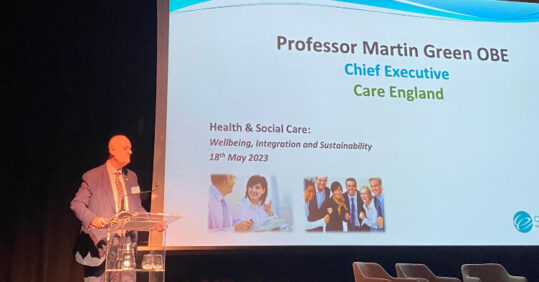‘New way of thinking’ required for growing the social care workforce

Social care providers must think ‘differently’ and ‘creatively’ about how to grow and sustain the workforce, the chief executive of Care England has said.
Professor Martin Green told health and social care leaders that an ‘attitudinal’ shift was needed to move towards a modern model of care which focussed on long-term conditions.
Speaking about workforce shortages in social care at the Health and Social Care Workforce: Wellbeing, integration and sustainability conference on Thursday, Professor Green said: ‘We are not going to solve this problem by doing what we’ve always done.
Related Article: NHS 10-year plan: What does it mean for nursing?
‘We need to think differently, think creatively, think in a new way about how we attract people, enable them, sustain them so they have good quality experience in their jobs, and also respect them.’
One way in which Professor Green suggested that social care could also operate differently was through regulatory reform and a move towards an ‘airline model’ of regulation.
‘In the airline industry, when there is a critical incident, they do a forensic analysis which is non-judgemental of what happened,’ noted Professor Green.
‘When they have done that analysis, they give key messages to individual practitioners about where their practise needed to change, then they give key messages to the organisation to ensure the same thing doesn’t happen again.’
Professor Green said that, currently, if a care worker made a mistake, they would be scared that the regulator would ‘hang me out to dry [and] not help me to improve my practise’.
Related Article: Funded nurse workforce plan needed for neighbourhood health services
He also called for the creation of a ‘national workforce strategy’ for the social care sector equivalent to that currently anticipated for the NHS in England.
While Professor Green acknowledged that his suggestions would require ‘a big shift for many organisations and for some individuals and structures’ he maintained that this was a ‘a prize worth striving for’.
‘The situation in 2023 is different to how it was in 1948, and we’ve got to step up and elevate and be creative; not only in terms of how we train and develop people but in how we use technology more effectively,’ he said.
Related Article: Over one million children living in homes causing asthma and chronic illness
In 1948 the National Assistance Act was passed by parliament, widely considered to be the origins of social care and the birth of the ‘Welfare State’.
Professor Green added that ‘the 21st Century is about long-term conditions, and it’s about enabling people to live well with a long-term condition and how to manage it in ways that enable them to live a life’.

See how our symptom tool can help you make better sense of patient presentations
Click here to search a symptom




